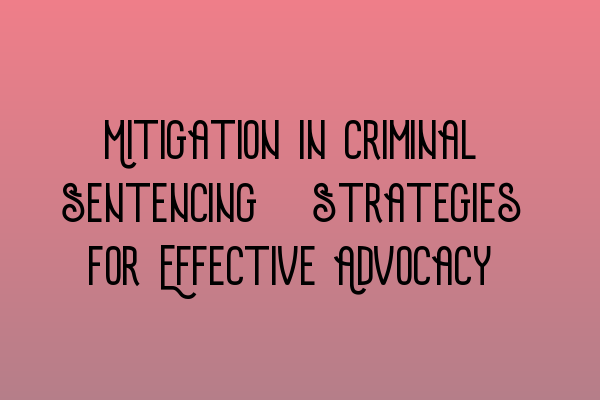Mitigation in Criminal Sentencing: Strategies for Effective Advocacy
Welcome to SQE Criminal Law & Practice Law UK! In this blog post, we will discuss the topic of mitigation in criminal sentencing and provide you with strategies for effective advocacy. Mitigation plays a crucial role in criminal cases as it can lead to a reduction in the severity of sentencing or influence the type of penalties imposed.
Understanding Mitigation
Mitigation involves presenting evidence or arguments to the court that aims to convince the judge to consider certain factors that may lessen the defendant’s culpability or warrant a more lenient sentence. Effective advocacy in mitigation requires thorough preparation and a clear understanding of the key elements that can be used to build a compelling case.
One of the crucial aspects to consider is the defendant’s personal circumstances. These may include their background, upbringing, education, employment history, and any mental health issues. By highlighting these aspects, it is possible to present a well-rounded picture of the defendant’s life and potentially garner sympathy from the court.
Furthermore, it is essential to identify any mitigating factors specific to the offense committed. These factors may include remorse, cooperation with law enforcement, lack of previous convictions, or the presence of extenuating circumstances that influenced the defendant’s conduct. By emphasizing these factors, you can demonstrate that the defendant’s actions were out of character or driven by external factors beyond their control.
When presenting mitigation, it is important to structure your arguments effectively. Begin by outlining the most compelling factors and then provide supporting evidence, such as character references, testimonials, or expert opinions. By presenting a solid case backed by credible evidence, you increase the likelihood of the court considering leniency in sentencing.
Strategies for Effective Advocacy
When advocating for mitigation, there are several strategies that can enhance your effectiveness as a solicitor:
- Thorough preparation: Gather all relevant information about the defendant and the offense committed. This includes conducting interviews, reviewing documents, and consulting experts if necessary.
- Empathy and understanding: Develop a deep understanding of your client’s situation and show empathy towards their circumstances. This can help you present a more compelling case to the court.
- Clear and concise presentation: Present your arguments in a logical and concise manner. Avoid unnecessary jargon and use language that is easily understandable to the court.
- Building credibility: Use credible sources of evidence, such as expert opinions or testimonies from reputable individuals who can vouch for the defendant’s character or circumstances.
- Effective storytelling: Craft a narrative that humanizes the defendant and highlights their journey, struggles, or personal growth. This can help evoke empathy and understanding from the court.
By incorporating these strategies into your advocacy for mitigation, you can greatly improve your chances of achieving a favorable outcome for your clients.
Conclusion
In conclusion, mitigation in criminal sentencing is a vital aspect of effective advocacy. By understanding the key elements to consider, structuring your arguments effectively, and employing solid strategies, you can significantly impact the sentencing outcome for your clients. At SQE Criminal Law & Practice Law UK, we are committed to providing comprehensive preparation courses for the SQE 1 and SQE 2 exams. If you’re looking to enhance your legal knowledge and skills, check out our SQE 1 Preparation Courses and SQE 2 Preparation Courses.
Stay updated with the latest SQE exam dates by visiting our site SRA SQE Exam Dates. For additional practice materials, explore our SQE 1 Practice Mocks FLK1 FLK2 and SQE 1 Practice Exam Questions. We are here to support your legal journey and help you excel in your career.
